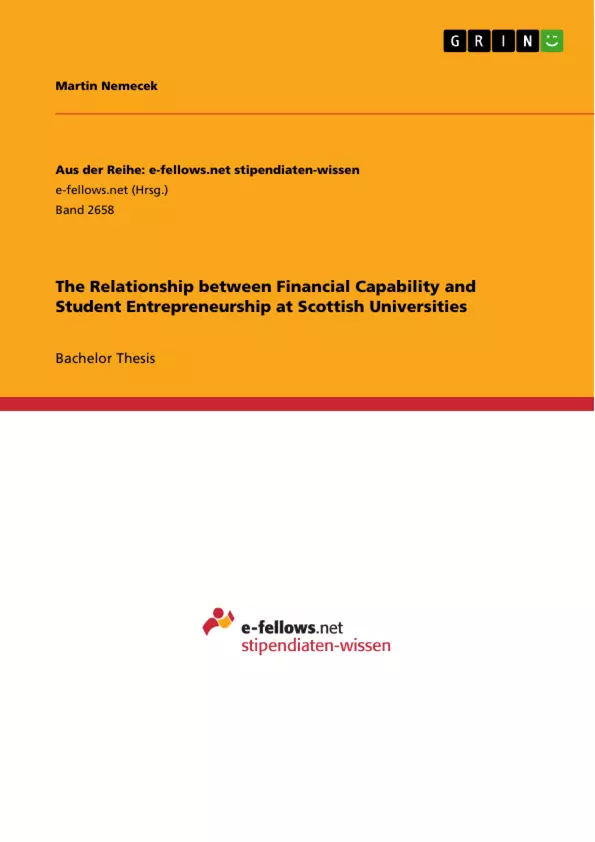This study aimed to analyse the relationship between financial capability and student entrepreneurship at Scottish universities. Three research questions were considered based on the gaps and disagreements highlighted in the literature review. First: ‘What is the level of financial capability of student entrepreneurs at Scottish universities and how does it differ from that of other students?’ Second: ‘What factors contribute to the financial capability development of student entrepreneurs?’ and third: ‘What are the relationships between specific components of financial capability and entrepreneurial attitudes and intentions?’
Using a mixed method design to data collection, the study incorporated an online questionnaire and face-to-face interviews. Data were collected from 107 students and 30 student entrepreneurs. The questionnaire findings showed that student entrepreneurs exhibited higher levels of financial capability, were more willing to take risks and also viewed entrepreneurship as less risky, when compared to other students. The data also suggested the need for improving students’ financial capability, especially regarding investments. Furthermore, the research established a remarkable relationship between financial capability and entrepreneurial attitudes and intentions. Interview data indicated that the development of financial capability is a complex process, but it is mainly shaped by parental influence, followed by internal triggers, experience concerning work and business and independent living.
By establishing the need for improved levels of financial capability and the relationships between entrepreneurship and financial capability, this study recommends that both financial capability and entrepreneurship development programmes and policies should be encouraged to target students and student entrepreneurs with the groups’ specific requirements in mind.
Inhaltsverzeichnis (Table of Contents)
- 1 Introduction
- 1.1 Research Problem
- 1.2 Research Aim and Objectives
- 1.3 Research Questions
- 1.4 Structure
- 2 Literature Review
- 2.1 Financial Capability
- 2.2 Entrepreneurship
- 2.2.1 Student Entrepreneurship
- 2.3 Financial Capability and (Student) Entrepreneurship
- 2.4 Conclusions of Literature Review
- 3 Research Methodology
- 3.1 Research Method
- 3.2 Sampling
- 3.3 Primary Data
- 3.3.1 Questionnaire
- 3.3.2 Interviews
- 3.4 Secondary Data
- 3.5 Ethical Considerations and Procedures
- 3.6 Data Analysis
- 3.6.1 Level of Financial Capability (RQ1)
- 3.6.2 Financial Capability Development (RQ2)
- 3.6.3 Relationships between Components (RQ3)
- 3.7 Limitations
- 3.8 Conclusions of Research Methodology
- 4 Results
- 4.1 Descriptive Statistics
- 4.2 Level of Financial Capability
- 4.2.1 Components of Financial Capability
- 4.3 Financial Capability Development
- 4.4 Relationships between Components
- 4.5 Conclusions of Results
- 5 Discussion
- 5.1 Level of Financial Capability
- 5.2 Financial Capability Development
- 5.3 Relationships between Components
Zielsetzung und Themenschwerpunkte (Objectives and Key Themes)
This study aimed to investigate the relationship between financial capability and student entrepreneurship at Scottish universities. Three research questions were explored, focusing on the level of financial capability among student entrepreneurs, factors influencing financial capability development in this group, and the relationship between specific financial capability components and entrepreneurial attitudes and intentions.
- Financial capability of student entrepreneurs in Scottish universities
- Factors contributing to the financial capability development of student entrepreneurs
- Relationship between financial capability components and entrepreneurial attitudes and intentions
- Development of financial capability as a complex process shaped by parental influence, internal triggers, work experience, and independent living.
- Need for improved financial capability among students, particularly concerning investments.
Zusammenfassung der Kapitel (Chapter Summaries)
- Chapter 1: Introduction introduces the research problem, research aim and objectives, research questions, and the structure of the dissertation.
- Chapter 2: Literature Review explores the concepts of financial capability and entrepreneurship, focusing on student entrepreneurship. This chapter also examines the existing literature on the relationship between financial capability and (student) entrepreneurship.
- Chapter 3: Research Methodology outlines the research method, sampling strategy, data collection methods, ethical considerations, and data analysis procedures. It also discusses the limitations of the study.
- Chapter 4: Results presents the descriptive statistics, analysis of the level of financial capability, financial capability development, and the relationships between specific components of financial capability.
- Chapter 5: Discussion interprets the results of the study in light of the existing literature, drawing conclusions about the level of financial capability among student entrepreneurs, the factors that contribute to financial capability development, and the relationship between financial capability and entrepreneurial attitudes and intentions.
Schlüsselwörter (Keywords)
This study focuses on the relationship between financial capability and student entrepreneurship at Scottish universities. Key terms and concepts include financial capability, student entrepreneurship, entrepreneurial attitudes and intentions, risk perception, and investment knowledge. The research explores the development of financial capability through parental influence, internal triggers, work and business experience, and independent living.
Frequently Asked Questions
What is the link between financial capability and student entrepreneurship?
The study established a significant relationship where student entrepreneurs generally exhibit higher levels of financial capability than other students.
How do student entrepreneurs perceive risk compared to their peers?
Student entrepreneurs in Scottish universities were found to be more willing to take risks and viewed entrepreneurship as less risky than non-entrepreneurial students.
What factors influence the development of financial capability in students?
Development is shaped primarily by parental influence, followed by internal triggers, work/business experience, and living independently.
In which financial area do students need the most improvement?
The data suggests a specific need for improving students' financial capability regarding investments.
What methodology was used for this study?
The researcher used a mixed-method design, incorporating an online questionnaire with 107 students and face-to-face interviews with 30 student entrepreneurs.
- Arbeit zitieren
- BA (Hons) Martin Nemecek (Autor:in), 2016, The Relationship between Financial Capability and Student Entrepreneurship at Scottish Universities, München, GRIN Verlag, https://www.grin.com/document/388041



